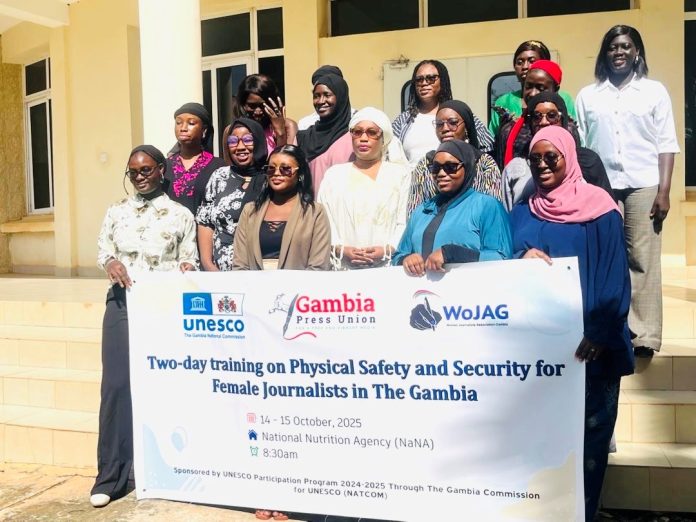By Mariama Marong
The Gambia Press Union (GPU), in collaboration with the Women Journalists Association of The Gambia (WoJAG) and with support from UNESCO, has launched a four-day intensive training workshop aimed at strengthening the safety of women journalists in the country. The initiative, which began this week at the National Nutrition Agency (NaNA) in Bakau, brings together 21 female journalists for hands-on sessions on both physical and digital safety.
The training is designed to equip participants with essential skills to navigate challenging reporting environments, counter gender-based harassment, and enhance digital security. Organizers say the effort is part of a broader campaign to make journalism in The Gambia safer and more inclusive, particularly for women who are disproportionately affected by threats and abuse.
During the opening ceremony, GPU President Isatou Keita underscored the unique challenges faced by women journalists, noting that they encounter not only the general risks inherent in the profession but also “additional and often overlooked dangers, including sexual harassment, gender-based discrimination, and online abuse.” Keita highlighted the GPU’s long-standing commitment to journalist safety through the development of safety manuals, provision of protective gear, and organization of regular training sessions, especially during volatile periods.
“This project adopts a gendered approach to journalist safety,” Keita said. “It focuses on protecting and empowering female media professionals through practical training and necessary institutional reforms.” She expressed gratitude to UNESCO for its crucial support, emphasizing the role such initiatives play in fostering accountability and respect within Gambian newsrooms.
WoJAG President Annet Camara echoed these sentiments, stating that the training comes at a critical time when women journalists are being increasingly targeted both online and offline. “Women face double threats for being journalists and for being women,” Camara said, citing recent incidents of online harassment against female reporters. She stressed that “safety is not a privilege, but a professional right,” and argued that secure working environments enable women to amplify marginalized voices and strengthen democracy.
Maimuna Sidibeh, Secretary General of the Gambia National Commission for UNESCO, reaffirmed the organization’s commitment to journalist safety across the globe. Sidibeh drew attention to the heightened vulnerability of women in media to online harassment, including cyberstalking and the non-consensual sharing of images. She called for stronger national mechanisms to combat these threats, aligning the initiative with the UN Plan of Action on the Safety of Journalists, which urges member states to prevent, protect, and prosecute crimes against journalists.
The four-day workshop features modules on digital safety, hostile environment reporting, and emergency response. Organizers hope the training will ensure Gambian women journalists can carry out their vital work with greater confidence, freedom, and security.


















